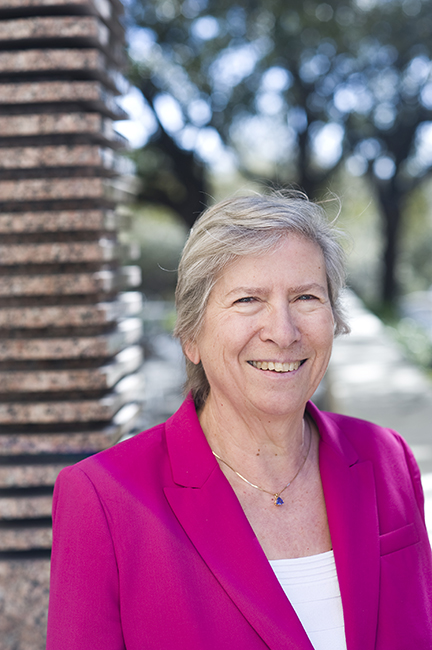Editor’s Note: This is part of a series of Q-and-A’s with UT’s deans. This interview has been edited and condensed. Sharon Mosher has been dean of the Jackson School of Geosciences since 2009.
The Daily Texan: Can you tell us a little bit about the school and some of the interesting projects going on right now?
Sharon Mosher: A little bit about the school: We have one academic department and two major research units. Two-thirds of our school are research scientists. One-third are faculty and students. We are the largest academic geoscience program in the country. We graduate the most geoscience students at every level. We work on everything from the core to the atmosphere and also the planet. We work to increase students’ knowledge. We get them involved in internships so they can see what practicing geoscientists do. We even involve undergraduate students in research projects. By doing research, they learn how to solve problems and think quickly. We have a lot different projects going on. A lot of people working on the Texas drought. Everything from soil, soil moisture, interaction between land surface and atmosphere, rivers and river flow. We have large programs in Antarctica and also in Greenland.
DT: Can you tell us a little bit about the genesis of the school?
Mosher: [Geologist and philanthropist] Jack Jackson bequeathed his estate to UT — it was worth $241 million then. He felt very strongly about two things. One was the importance of geoscience in terms of understanding energy, water, minerals and resources in the environment. The other thing he felt strongly about was UT. In particular, it bothered him that UT’s geoscientists were spread out across several units. We didn’t report to the same people and interact. He felt like we were less than the sum of our parts and that if he could get us to become a school and work together, we could do amazing things. That’s the reason he donated the money.
DT: What is your primary goal for the school?
Mosher: My goal is to have the Jackson School be the best it can be. Or the best in geoscience education. And to have a school where people from different units work well together, a school that is pushing the frontier of science but also very community based that can help the students meet their potential. We are asked to try to build a national community for future geoscience undergraduate education.
DT: What is your greatest challenge as dean?
Mosher: The whole University is in severe financial straits at the moment. So one big challenge is to keep everything moving forward in a positive way and yet have less budget every year. Since we became a school, we doubled the size of the faculty, and we also doubled the size of each of the research units. We hire extremely collaborative, interdisciplinary people. My other biggest challenge is keeping other universities from stealing my staff and faculty away from me.
DT: Speaking of the shrinking state budget, do you find you have to fundraise more than you used to?
Mosher: I always fundraise. As of July I will have been dean for six years. Every year I have been dean, I have had to cut my budget. I fundraise all the time. I spend at least two days out of every month out raising funds. Some months more.
DT: What do most students do after graduating?
Mosher: It depends on if they are undergraduate or graduate students. A large percentage of undergraduate students go to graduate school. Up until this year, with the oil boom, a lot of the undergrads went directly into industry, working mostly for surface companies but also in environmental consulting and for the Texas Commission on Environmental Quality, different state agencies and the U.S. Geological Survey. Sixty to 70 percent of master’s students will go into energy. A small fraction will go into environmental consulting. The rest will go on for Ph.D.s.
DT: Is there anything else you want students to know about the school?
Mosher: Two things. One thing in particular that makes us unique is that we are field-intensive. We make sure our students have the opportunity to go out not just locally, but internationally and really see geology. And we do that both at the undergrad and graduate level. That’s a really important part of their education. The other emphasis is students doing research. It’s a very vibrant and intellectually stimulating place.
















